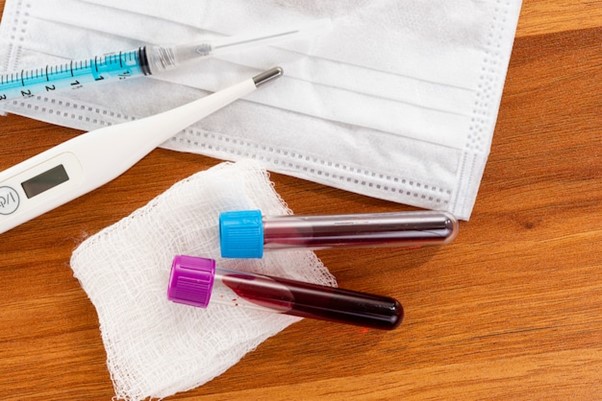Fever is one of the most common symptoms of illness and serves as a natural response by the body to fight infections. While it may seem like a straightforward symptom, the underlying cause of a fever could range from mild viral infections to severe conditions like dengue, typhoid, or malaria. This is where fever profile tests become crucial—they help diagnose the root cause of fever and guide timely and appropriate treatment.
At SEVA DIAGNOSTICS, we understand that unexplained fevers can be distressing. With our advanced fever profile testing and personalized care, you can take the first step toward recovery with confidence. In this blog, we’ll discuss what fever profile tests are, why they’re essential, and how they can help you or your loved ones stay healthy.
What Are Fever Profile Tests?
Fever profile tests are a group of diagnostic blood and urine tests designed to identify the cause of fever. Since fever can result from various infections or conditions, these tests offer a comprehensive overview of key indicators in the body. Fever profile tests screen for common fever-related illnesses such as:
- Viral infections
- Typhoid fever
- Malaria
- Dengue fever
- Urinary Tract Infections (UTI)
- Hepatitis
By analyzing blood and other samples, fever profile tests provide valuable insights that help doctors pinpoint the infection or issue causing the fever. This ensures patients receive targeted and effective treatments.
When Should You Consider Fever Profile Testing?
Not all fevers require a profile test; in many cases, fevers resolve on their own. However, certain signs and symptoms indicate the need for diagnostic testing. You should consider a fever profile test if you experience:
- Prolonged Fever: A fever lasting more than 3–4 days without improvement.
- Recurring Fever: Episodes of fever that come and go without an obvious cause.
- High-Grade Fever: Severe fever with temperatures above 102°F (39°C).
- Associated Symptoms: Symptoms like chills, body aches, headache, nausea, rash, or yellowing of the skin and eyes.
These symptoms may point to underlying infections that require immediate attention.
What Does a Fever Profile Test Include?
A fever profile test involves a series of diagnostic procedures to evaluate the cause of fever. Below is a breakdown of some common tests included in a fever profile:
Complete Blood Count (CBC): A CBC is a basic yet crucial test that evaluates red blood cells, white blood cells, and platelets.
- A high white blood cell count may indicate an ongoing infection, while low platelets could point to dengue or other conditions.
Erythrocyte Sedimentation Rate (ESR): ESR measures the rate at which red blood cells settle in a test tube.
- A high ESR can indicate inflammation or infection in the body.
Malaria Antigen Test: This test checks for the presence of malarial parasites in the blood, helping to confirm or rule out malaria.
Typhoid Test (Widal Test): The Widal test is used to detect typhoid fever by identifying antibodies against Salmonella bacteria.
Dengue NS1 Antigen Test: This specific test helps diagnose dengue fever in the early stages.
Urine Routine Test: A urine test helps detect urinary tract infections or other abnormalities.
Liver Function Test (LFT): If jaundice or hepatitis is suspected, an LFT evaluates liver enzyme levels and bilirubin to confirm the diagnosis.
Blood Culture; For severe or unexplained fevers, a blood culture may be done to identify bacteria or fungi causing the infection.
Each of these tests plays a unique role in evaluating fever-related illnesses, ensuring no underlying condition is missed.
Why Are Fever Profile Tests Important?
Fever profile tests are essential for several reasons:
Early Diagnosis and Treatment: Fever is often the first warning sign of a more serious illness. Fever profile tests help detect conditions early, allowing doctors to initiate treatment promptly.
Targeted Care: Fever has many possible causes, and treating it blindly with over-the-counter medications can lead to complications. Fever profile tests ensure that treatments are specific to the underlying cause.
Preventing Complications: Untreated infections such as typhoid or malaria can escalate into life-threatening conditions. Accurate testing minimizes the risk of complications.
Monitoring Chronic Illnesses: Fever profile tests can help monitor infections in people with chronic illnesses like diabetes, kidney disease, or compromised immune systems.
How to Prepare for a Fever Profile Test
Preparing for a fever profile test is simple and straightforward. Here are a few tips to follow before your test:
- Fasting: Some tests, like liver function tests, may require fasting for 8–12 hours. Check with your healthcare provider.
- Stay Hydrated: Drinking water can help improve blood flow, making the blood draw easier.
- Provide Accurate Information: Inform your doctor about your medical history, ongoing medications, and any recent travel to areas with endemic diseases like malaria or dengue.
What to Expect During and After the Test
- Sample Collection: Blood and urine samples are collected for analysis. The process is quick and minimally invasive.
- Results Interpretation: Once the results are ready, your doctor will review the findings, explain the diagnosis, and recommend appropriate treatment.
- Follow-Up: After the diagnosis, follow your doctor’s instructions carefully. Fever-related illnesses may require antibiotics, antivirals, or supportive care like hydration and rest.
Preventive Tips to Avoid Fever-Related Illnesses
While fever profile tests help identify and manage infections, prevention is always better than cure. Here are some tips to reduce the risk of fever-related conditions:
- Maintain Hygiene: Wash hands frequently and avoid touching your face to minimize exposure to germs.
- Drink Clean Water: Avoid consuming contaminated water, which is a common source of typhoid and other illnesses.
- Use Mosquito Protection: Wear long-sleeved clothes, use insect repellents, and sleep under mosquito nets to prevent malaria and dengue.
- Get Vaccinated: Vaccines for diseases like typhoid, hepatitis, and influenza can protect you against serious infections.
- Boost Immunity: Eat a balanced diet, exercise regularly, and get enough sleep to strengthen your immune system.
Frequently Asked Questions (FAQs) About Fever Profile Tests
How long do fever profile test results take?
Results for most fever profile tests are available within 24–48 hours. However, some tests like blood cultures may take longer.
Can fever profile tests detect COVID-19?
While fever profile tests can detect other infections, a separate COVID-19 RT-PCR or antigen test is required to confirm COVID-19.
Are fever profile tests safe for children?
Yes, these tests are safe for children and are often recommended for diagnosing infections in younger patients.
Can I take medications before the test?
Inform your doctor about any medications you are taking. Some drugs may interfere with test results and may need to be paused.
Take Control of Your Health Today
Fever is more than just a symptom—it’s a signal from your body that something is wrong. Fever profile tests offer a reliable way to uncover the root cause and ensure you receive the care you need. Whether it’s a simple viral infection or a more serious condition like dengue or typhoid, early diagnosis can make all the difference.
Don’t let a fever disrupt your life. Schedule your fever profile test today at SEVA DIAGNOSTICS for accurate results and compassionate care. Call us or visit our website to book your appointment—because your health deserves nothing less than the best.


